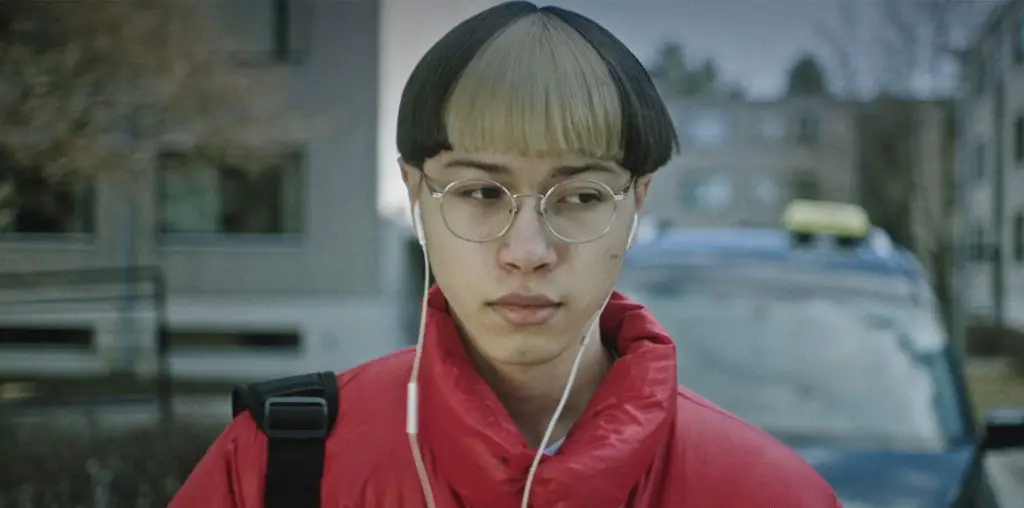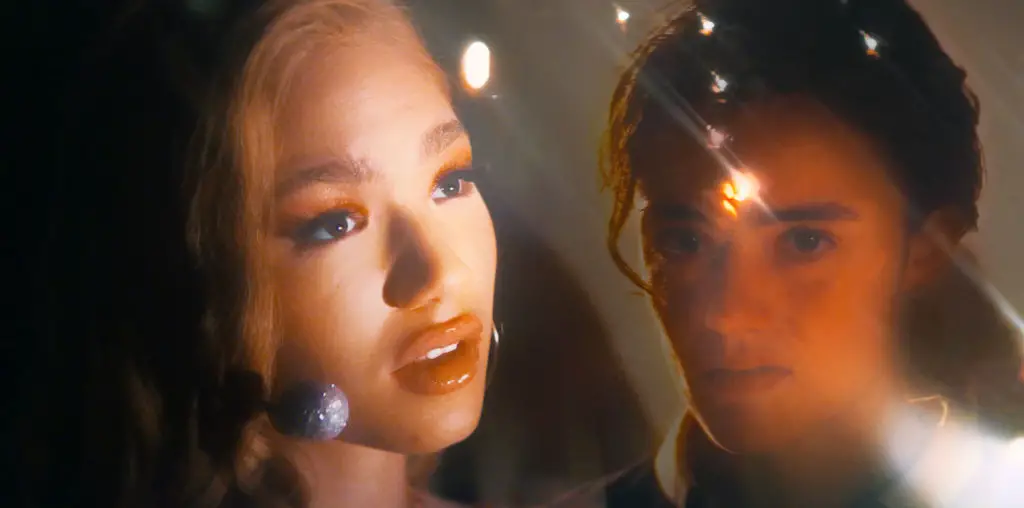
1. You sit in the darkened room, squirming uneasily, a black apprehension roiling in your gut. It’s like being strapped into a dentist’s chair as the drill approaches: your body braces for the pain, you feel the tom-tom pressure mounting in your skull as you try futilely to prepare for the upcoming onslaught, though there’s nothing you can do but hunker down and take the hit…
Yes, it’s time for the latest Todd Solondz comedy.
“Happiness”, unleashed on the general public in late October (just in time for Halloween), tells the loosely connected stories of the Jordan family, a clan whose dysfunction makes “The Simpsons” look like “Father Knows Best”. The story opens, appropriately, on romantic disintegration: lithely self-tormented Joy Jordan (Jane Adams) is breaking up with boyfriend Andy (Jon Lovitz). We’re not sure why she’s calling it off – but Andy breaks down painfully when he hears the bad news (a bout of weeping during which we are invited to chuckle). It seems a civil breakup, actually, until Andy asks her the reason for the heave-ho. “Is it someone else?” he wonders. “No,” she says coolly, “it’s just you.”
Bzzz! Ouch! Solondz the dentist is fast at work. The molar pain erupts after her sadistic line – bewildering because here is an apparently sensitive character who, one assumes, wouldn’t say this kind of thing. But then the irony sinks in: this mean-spirited quip springs from a masochistic desire to be alone. Uncomfortable with taking initiative, with being in the lead and asserting herself, Joy slides easily into habitual passivity as Andy, the dumpee, now becomes the dumper, and sadistically lashes into her for her remark. “You’re s**t,” he fumes, “and I’m champagne.” See, it’s better to be alone, the dentist whispers, his drill whirring; he turns blubbering Andy into a coldish thug. Joy says nothing as Andy verbally flogs her, she appears passive and even strangely comfortable in her discomfort, and later we will realize – after she hooks up with a chauvanist cab-driver who mindlessly fucks her and casually loots her apartment (with her shruggish consent) – that she, like the filmmaker is strangely comfortable here…here, in the hot-seat of emotional abuse, this sado-masochistic dentist’s chair designed by the merciless Todd Solondz…
2. Joy wants to be alone. She desires loneliness. Despite her half-hearted search, her behavior speaks to the fact that she feels she deserves nothing but solitude . Like the filmmaker (who becomes palpably uncomfortable when he moves too close to his characters), Joy has certainly dumped Andy because things were going well. Later, towards the end of the “story”, the pieces fall together, and we realize that her “It’s just you” begins to mean, It’s just that you’re too good to me…now please hate me and let me have it …
He lets her have it, as Solondz lets us have it, over and over again; like any good dentist his timing is exquisite: he saves the drilling jolt of terror for the precise moment we are ready to accept or feel warm toward a character he so carefully gets us to trust. When the apparently self-loathing Kristina (Camryn Manheim) finally succeeds in the prolonged, painful wooing of her neighbor, the genuinely self-loathing Allen (Philip Seymour Hoffman ), she decides to reveal at the brink of hard-won romance that she is in fact an axe-murderer. We hear an amusing tale of dismemberment at the end of an enjoyable date, a few jokes about castration after heavy doses of Air Supply. Gotcha! Self-deluded housewife Trish lunches with her even more self-deluded sister Helen, and for a moment we are lulled into accepting some pretense (however shallow) of sisterly bonding. But even this slim pretense is pulverized: when Trish opens to Helen and tells her that she admires her writing achievements and that she herself may write a novel someday, Helen responds with typical ice-faux enthusiasm, “And I’m sure it’ll be good.” Zang! Pow! When Joy learns that Andy, dumped at the beginning of the movie, has committed an ugly suicide, she tearfully relates the news to his co-workers – and instead of seeing sympathy, we laugh heartily in discovering that no one can remember what the poor schmuck looked like! Next patient, please…
There are other examples of this, countless and countless examples on Solondz’s hit-parade of cruelty, though none are more painful than the child-abusing therapist (Dylan Baker) who decides, bizarrely, to confess his sins to his 11-year-old boy (Justin Elvin) in full and harrowing detail. After carefully setting up the complexity of therapist Bill Maplewood , and the film’s one semi-warm relationship -between Bill and his son – the filmmaker zaps us yet again with an excruciating jolt to the nerve. “Would you f**k me?” asks the son, shaking and weeping, after the truth has been brutally dumped on him. “No,” says the tearful father, “but I’d jerk off.” We laugh uncomfortably, at the father’s “ironic” “honesty”, as the film’s sole compelling character become yet another passive thug. And the son is punished (scarred for life, we may assume ) along with the audience, for being drawn to Bill, for trusting him and the filmmaker who created him, the film’s final possible warmth vaporized by a one-liner . This, surely, is the dentist’s finest hour…
3. Solondz is no Fassbinder, no Bunuel nor a Kubrick – though he may have the potential. For now, though, he lacks the bleakness of his own bleak humor, because of his limited range. He zeroes in on easy targets -characters who already hate themselves, and a zombified hipster audience that gets its kicks from being tortured. A subtle bully, he cheats, always, by shrinking away from larger insights and potential drama. Instead of a wider swipe at society, or culture, or the commercial powers that numb us, we laugh shallowly at the cruelty of shallow idiots. And so instead of a more deeply challenging parody of the culture at large (an approach favored by Bunuel – and Woody Allen) it becomes shooting fish in a barrel, a repetitive orgy of destroying the weak.
Subversive? Surely. For not only does he subvert the clichŽs of suburban “happiness”, he subverts his own narrative range. He cheats, doesn’t play fair, because he always shrinks from potential complexity for the sake of a laugh . There is the beginning of an interesting dynamic between obscene phone-caller Allen and ice-queen Helen – when he calls her to berate her anonymously, she gets turned on by the verbal rape (she sees it as “research”), which in turn startles the crap out of him. The film’s one cruel-free laugh comes in a marvelously hysterical cut, when we go from Allen in sneakily perverted sadist mode to Allen drunkenly confused, after he receives a startlingly lusty response to his call. The great irony is that she wants to be abused, and Allen in his postmodern manhood must rise to the occasion – finally receiving his wish (which scares him) while remaining her anonymous neighbor in reality.
But Solondz quickly backs away from this possibility, because to explore it would be to invest emotionally in a character, a situation, and we sense that he needs desperately to stay detached. Investing in this storyline would allow the audience, finally, a bit of pleasure in seeing a situation authentically unravel, but the dentist will have none of it. Here we finally have a situation where each character’s pathology is challenged – where the masochism may turn into sadism, and vice-versa – the kind of reversal which could serve as a compelling engine for comedy. But this is not comedy, this is surgery…and Solondz, in his aggressive passivity, doesn’t want drama, does not want to reveal too much of himself; he only wants to lurk in the corner with his dentist’s drill.
His characters, like him, remain isolated and detached, loveless, allowed only to jerk off while indulging in fantasies of humiliation and rape. He does allow Allen a bit of creature comfort: Allen climbs sheepishly into bed with Kristina – except, naturally, there is no touching, he may only sleep beside her, their backs to each other as they lay curled in fetal isolation. Yet at least there is a woman here, an actual human being which whom he may share his loneliness – it seems a semi-comforting coda…until we learn later, of course, that Kristina has been caught for the axe-murder and hauled off to prison. Bzzzzzz!
4. In the end, Allen remains banished in his cell of solitary confinement – as we too are punished, mostly merely having the desire for warmth, for being stupid enough to expect something other than rejection. Like a child who dares to ask for more than the gruel that is given, we find ourselves overpowered by a surge of hostility, cleverly delivered by the filmmaker who (like a manipulative parent) is firmly in control of our world. Reduced to children in an overly-controlled environment, we sense that to complain is to invite mockery – and, in case we don’t quite “get it”, more sadism and heartless laughter awaits around the corner to jolt us into complacency. We can only stare blinkingly at the meanness heaped upon us, the way Dawn Wiener in “Welcome to the Dollhouse” (Solondz’s last film) never quite lashed out against those who tormented her , merely accepted her fate with strange passivity.
So we the audience sit, laughing at the characters’ suffering even as we are drilled by the sadism. We like it both ways, would rather cling to the pattern of pain than open to the uncontrolled possibility of genuine narrative. The success of Solondz seems to confirm this – it suggests that we, like Joy, desire that cruelty, since it confirms our cynical assumptions about our ugliness and deserved solitude. This self-directed cynicism becomes, ironically, the postmodern hipster’s security blanket: anything beyond machine-like irony is scary. Like emotionally abused children who compulsively repeat the past, we embrace this bullying cinema of abuse and self-abuse (which, sadly, is at least authentic and therefore preferable to Hollywood’s bullshit sentimentality), and flit like moths to the light of the dentist’s office. Despite the fact that our habit of “hipness” seems to have become a bad habit, we seem ever-hungry for the next series of humiliations, sobbings and stabbings that define the current indie cinema.

